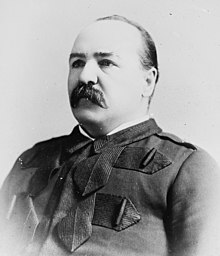You can help expand this article with text translated from the corresponding article in Russian. (August 2024) Click [show] for important translation instructions.
|
Joseph-Elzéar Bernier (January 1, 1852 – December 26, 1934) was a Canadian mariner from Quebec who led expeditions into the Canadian Arctic in the early 20th century.

He was born in L'Islet, Canada East, the son of Captain Thomas Bernier and Célinas Paradis.[1] At the age of 14, he became a cabin boy on his father's ship. Three years later, he became captain of his own ship and commanded sailing ships for the next 25 years. Bernier was named governor for the jail at Quebec City in 1895. From 1904 to 1911, he explored the Arctic archipelago on annual voyages in his ship the CGS Arctic and officially claimed the islands for Canada. Bernier retrieved documents that had been stored in caches by earlier Arctic explorers. He also established Royal Canadian Mounted Police posts in the Canadian north. During World War I, Bernier commanded a ship which transported mail along the eastern coast and carried goods in convoys across the Atlantic. He returned to patrolling the arctic after the war's end, continuing until his retirement in 1925, when he was awarded the Royal Geographical Society's Back Award.
Historian and expert on Northern Sovereignty Michael Byers noted that Bernier placed a plaque on Melville Island, in 1909, claiming Canadian Sovereignty over not only the entire Arctic Archipelago, but a wedge of the Arctic Ocean "from longitude 60°W to 141°W up to latitude 90°N," ie, all the way to the North Pole.[2] Byer characterized this claim as an articulation of sector theory, and noted how diplomats had widely rejected Russia's claims to a wedge of the Arctic, extending to the North Pole.
Bernier died of a heart attack in Lévis at the age of 82.
He published Master Mariner and Explorer: A Narrative of Sixty Years at Sea ... in 1939.
Joseph Idlout's daughter, Leah Idlout, has said that her father was the son of Bernier. It is thought that Idlout may have been the only son of Bernier.[3]
Joseph-Elzéar Bernier and his Northern expeditions are featured on pages 12 & 13 of the 36 page Canadian Passport.
Archives
editThere is a Joseph-Elzéar Bernier fonds at Library and Archives Canada.[4] Archival reference number is R7896.
References
edit- Joseph Bernier, the Arctic Islands for Canada, Pathfinders and Passageways: The Exploration of Canada, Library and Archives Canada
- Joseph Elzéar Bernier (1852-1934), Arctic profiles, University of Calgary Archived 2011-05-24 at the Wayback Machine (pdf)
- ^ Captain Joseph Elzéar Bernier, The Quebec History Encyclopedia
- ^
Michael Byers (2006-01-30). "The Need to Defend Our New Northwest Passage". The Tyee. Retrieved 2020-04-13.
The most famous articulation of this "sector theory" was made by Senator Pascal Poirier in 1907, and, two years later, Captain J.E. Bernier of the C.S. Arctic placed a plaque on Melville Island that still reads:
However, apart from the Soviet Union, which attempted a similar claim, other countries did not accept the sector theory.This Memorial is erected today to commemorate the taking possession for the DOMINION OF CANADA of the whole ARCTIC ARCHIPELAGO lying to the north of America from long. 60°W to 141°W up to latitude 90°N.
- ^ "Captain Bernier lives on". Archived from the original on 2016-03-04. Retrieved 2011-06-07.
- ^ "Finding aid to Joseph-Elzéar Bernier fonds, Library and Archives Canada". 25 November 2016.